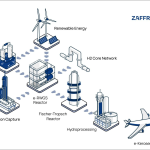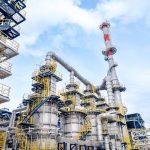Travel technology company Amadeus has bought a minority stake in CAPHENIA, a German renewable energy start-up that next year plans to produce fuels from synthetic gas, created by combining biogas, carbon dioxide, water and electricity. Through its globally patented Power-and-Biogas-to-Liquid (PBtL) process, CAPHENIA expects to produce more than 100 million litres of sustainable aviation fuel per year by 2030, and more than 1 billion litres by 2050. Neither company has revealed the scale or value of the investment, which Amadeus said was part of a broader commitment “to support the industry on its journey toward sustainable travel.” The pre-development phase of the CAPHENIA process began back in 2011 under the CCP Technology name, which then partnered with Lufthansa Group in 2012 for five years to help develop the PBtL process and the company has retained the involvement of a number of ex-Lufthansa Group senior executives as backers.
Lufthansa withdrew from the partnership in 2017, a decision which CAPHENIA said was driven by a change in management and strategy. However, a group of former and serving Lufthansa Group executives remained as shareholders in CCP, which was rebranded as CAPHENIA. They included the former CEO of Austrian Airlines, Kay Kratky; the former CFO of Lufthansa Group, Simone Menne; and the-then CEO of Lufthansa Cargo, Peter Gerber, who is now CEO of Brussels Airlines.
Others later joined them as investors, including Lufthansa Group’s former CEO, Dr Christoph Franz, the former CFO of Swiss, Dr Roland Busch, and another former CEO of Austrian, Dr Peter Malanik.
CAPHENIA claim synthetic fuels developed through its PBtL system have a CO2 reduction of up to 92% compared to fossil fuels, bringing the company’s process “closer to CO2 neutrality than any other fuel production route,” it says. Where standard processes for creating synthesis gases require processing in multiple reactors and units, the German start-up says it uses what it calls a three-in-one zone reactor, which requires much less electricity than other processes and produces fuel faster and potentially cheaper.
The company said construction of a production plant would begin later this year at Industriepark Hochst, a Frankfurt facility with both infrastructure and plentiful supply of biogas and green electricity. As well, it added, the plant’s proximity to Frankfurt Airport would be important in helping to meet airline demand for SAF.
“For airlines, sustainable aviation fuel is the practical, long-term alternative to conventional aviation fuel,” said CAPHENIA’S founder and CEO, Dr Mark Misselhorn. “Our process is affordable – using one-sixth of the electricity needed for alternative SAF production methods – and scalable. We have an ambition to offer large-scale production by 2028, aiming to fill the gap between anticipated SAF demand and current supply.”
Announcing its investment in CAPHENIA, Amadeus said it wanted to participate in decarbonising air transport. “We are committed to supporting the move to sustainable travel,” said Suzanna Chiu, Head of Ventures, Amadeus. “We monitor industry trends and developments to determine the most effective ways we can fulfil this ambition, and are delighted to act with the investment in an innovative SAF company.”
Amadeus said it was “keen to be a part of the discussion and also part of the solution” as the air transport sector worked to decarbonise flights. “Given the important role SAF is likely to have in lowering greenhouse gas emissions from aviation, this means stepping outside the software space on this particular investment,” the company said. “We are keen to see how production ramps up and how CAPHENIA can contribute to the aviation industry’s net zero targets.”
When CAPHENIA succeeded CCP after the Lufthansa withdrawal from the project in late 2017, most of the original shareholders remained, said Dr Misselhorn. The company has now secured more than 150 patents and has another 70 patent applications “in all relevant market regions” to protect various elements of its new fuel process.
“I want to help manage the transition to new fuels,” said Dr Franz, who is now chair of the board of directors at Roche Holding, one of the world’s largest pharmaceutical groups. “CAPHENIA’s ground-breaking technology can do just that,” he said in a statement published on the company’s website. “I was already convinced of this as CEO of Lufthansa. That’s why I have invested in CAPHENIA and am actively involved as a shareholder.”
Fellow shareholder Peter Gerber agrees, stating: “Every generation has its challenges. Avoiding carbon emissions is without doubt ours. CAPHENIA’s technology is ground-breaking in this respect: carbon dioxide is turned into a usable commodity on an industrial scale through recycling.”
Photo: Lufthansa Group partnered with CAPHENIA’s predecessor between 2012 and 2017 to help develop the PBtL process












More News & Features
Concrete Chemicals consortium secures €350m public funding for German eSAF project
SAF One announces new investment and technology partners for Middle East SAF project
New studies confirm minor flight re-routing to avoid contrails would have major climate benefits
New initiative formed to accelerate SAF adoption and production in the Pacific Northwest
EcoCeres opens new Malaysia production facility as SAF ambition in Asia scales up
Aviation, shipping and fuel leaders convene in Rotterdam to accelerate sustainable fuels scale-up